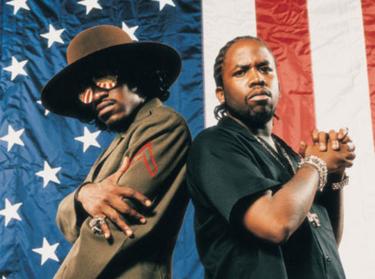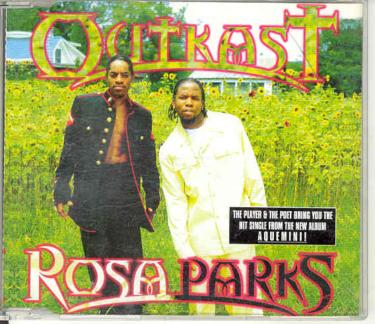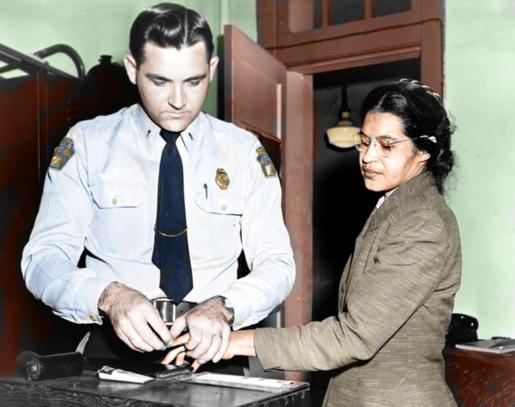Did Rosa Parks Sue Outkast For Their Song Named After Her?
Here is the latest in a series of examinations into urban legends about music and whether they are true or false. Click here to view an archive of the movie urban legends featured so far.
MUSIC URBAN LEGEND: Outkast was sued by Rosa Parks for a song named after her.
Outkast is one of the most successful hip hop groups of all time, managing to balance commercial success with critical acclaim, as well, including winning the Grammy Award for Best Album of the Year in 2004 for their novel release Speakerboxxx/The Love Below (where the two members of the group, Andre 3000 and Big Boi, each did a solo album and then released them together as a group double album).

Their 1998 hit album Aquemi featured a song called “Rosa Parks”…

The song was the biggest hit off of the album.
Rosa Parks, of course, is the civil rights icon who made history by being arrested after refusing to give up her seat on a bus to a white passenger in 1955. Her actions sparked the Montgomery Bus Boycott and was a major event in the pursuit of equal rights for African-Americans in the United States.

The intent of the song is to demonstrate how, like Parks changed the world of civil rights, Outkast was changing the world of hip hop. The only part of the song that actually refers to Parks is the chorus, which goes “Ah ha, hush that fuss / Everybody move to the back of the bus / Do you want to bump and slump with us / We the type of people make the club get crunk.”
It is certainly a bit iffy to draw comparisons between being influential hip hop artists and being a civil rights icon, but in any event, the guys clearly intended the song as an homage (if a bizarre one) to Parks.
However, she apparently saw it otherwise.
In 1999, Parks (through her legal representatives) filed a lawsuit against Outkast and their record label – Rosa Parks v. LaFace Records.
The theory behind the suit was that the group used Parks’ name without her permission in a song that was objectionable to her and caused damage to her public reputation (the song contained profanity). The case was a very interesting intellectual property case. As you might well know, pretty much anyone can write a song ABOUT someone (even there, of course, you can run afoul of stuff like libel), but that was the key here – as I noted before, the song really was not ABOUT Rosa Parks. However, it still was TITLED “Rosa Parks,” so the theory was that they were merely trading on the fame of her name, and if THAT is the case, then yes, she has rights to protect the use of her famous name.
Still, at each trial level, Outkast kept winning. However, the higher courts kept accepting the case on appeals, so the case continued for a number of years. As the case dragged on, Parks’ family began to believe that her lawyers were more concerned about their legal fees then what Parks herself wanted (she was in her late 80s and suffering from dementia).
In October of 2004, a judge named former Detroit Mayor Dennis Archer the overseer of Parks’ legal affairs, and in early 2005 the case was finally settled. Outkast admitted no wrongdoing, but paid Parks a monetary settlement and agreed to do some work with the Rosa and Raymond Parks Institute for Self Development.
Parks passed away in October of 2005 at the age of 92.
The legend is…
STATUS: True
Feel free (heck, I implore you!) to write in with your suggestions for future installments! My e-mail address is bcronin@legendsrevealed.com.





